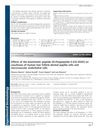 January 2025 in “Current Issues in Molecular Biology”
January 2025 in “Current Issues in Molecular Biology” Certain plant extracts may help prevent hair loss and promote hair growth safely.
 7 citations,
December 2015 in “Experimental Dermatology”
7 citations,
December 2015 in “Experimental Dermatology” Sh-Polypeptide 9 may be better than minoxidil for hair growth and protection against damage.
 January 2014 in “Journal of Investigative Dermatology”
January 2014 in “Journal of Investigative Dermatology” Proteins like aPKC and PDGF-AA, substances like adenosine and ATP, and adipose-derived stem cells all play important roles in hair growth and health, and could potentially be used to treat hair loss and skin conditions.
 58 citations,
January 2006 in “Skin Pharmacology and Physiology”
58 citations,
January 2006 in “Skin Pharmacology and Physiology” High levels of testosterone and 5α-DHT can lead to cell death in cells important for hair growth.
 24 citations,
January 2015 in “Annals of Dermatology”
24 citations,
January 2015 in “Annals of Dermatology” Herbal extracts may help hair grow and could be an alternative to synthetic hair loss treatments.
 42 citations,
February 2018 in “International Journal of Molecular Sciences”
42 citations,
February 2018 in “International Journal of Molecular Sciences” Minoxidil boosts hair growth by triggering growth factor release from specific stem cells.
 March 2024 in “Journal of Experimental & Biomedical Sciences/Biomedical Science Letters”
March 2024 in “Journal of Experimental & Biomedical Sciences/Biomedical Science Letters” BCC can protect heart cells from damage caused by oxidative stress.
 47 citations,
April 2000 in “The American journal of pathology”
47 citations,
April 2000 in “The American journal of pathology” Bcl-2 overexpression protects against UVB damage but worsens hair loss from chemotherapy.
 15 citations,
August 2006 in “Journal of Cutaneous Pathology”
15 citations,
August 2006 in “Journal of Cutaneous Pathology” HIV-1 may cause increased stem cell death in hair follicles, leading to hair loss.
 4 citations,
January 2001 in “Archives of Biochemistry and Biophysics”
4 citations,
January 2001 in “Archives of Biochemistry and Biophysics” Activated ras can protect kidney cells from a certain substance that causes cell death.
 1160 citations,
November 2018 in “Physiological Reviews”
1160 citations,
November 2018 in “Physiological Reviews” The document concludes that better targeted treatments are needed for wound healing, and single-cell technologies may improve cell-based therapies.
 106 citations,
July 2013 in “Advances in wound care”
106 citations,
July 2013 in “Advances in wound care” UV radiation can help sterilize wounds and promote healing but requires careful use to avoid damaging cells.
 149 citations,
July 2002 in “Dermatologic clinics”
149 citations,
July 2002 in “Dermatologic clinics” Patients with certain skin symptoms and high ANA titers should be monitored for potential systemic lupus.
 5 citations,
January 2021 in “Biomedicine & Pharmacotherapy”
5 citations,
January 2021 in “Biomedicine & Pharmacotherapy” Policosanol helps treat hair loss by balancing hormones and supporting hair growth.
 50 citations,
February 2018 in “Biomedicine & pharmacotherapy”
50 citations,
February 2018 in “Biomedicine & pharmacotherapy” Ginseng may help treat cancer and reduce treatment side effects, but more research is needed.
 5 citations,
September 2022 in “Antioxidants”
5 citations,
September 2022 in “Antioxidants” A substance from Caulerpa racemosa seaweed may protect against skin damage caused by air pollution by reducing oxidative stress and cell death.
 4 citations,
September 2021 in “Biomolecules”
4 citations,
September 2021 in “Biomolecules” Using Platelet-Rich Plasma and Adipose-Derived Mesenchymal Stem Cells together can improve healing, including wound healing, bone regeneration, and hair growth.
 46 citations,
September 2014 in “Steroids”
46 citations,
September 2014 in “Steroids” Plant steroid hormones show growth, health, and medicinal benefits in various organisms, including potential for treating diseases.
 1 citations,
September 2013 in “Elsevier eBooks”
1 citations,
September 2013 in “Elsevier eBooks” Hair ages and thins due to factors like inflammation and stress, and treatments like antioxidants and hormones might improve hair health.
 9 citations,
October 2011 in “Journal of proteomics”
9 citations,
October 2011 in “Journal of proteomics” Taxol damages hair growth cells, causing hair loss.
 9 citations,
May 2005 in “Expert Review of Clinical Immunology”
9 citations,
May 2005 in “Expert Review of Clinical Immunology” Blocking interferon-gamma might help treat various autoimmune diseases.
 67 citations,
August 2007 in “American Journal of Pathology”
67 citations,
August 2007 in “American Journal of Pathology” Overexpressing the mineralocorticoid receptor in mouse skin causes skin thinning, early skin barrier development, eye issues, and hair loss.
 2 citations,
September 2022 in “Cellular and molecular biology”
2 citations,
September 2022 in “Cellular and molecular biology” Agaricus bisporus derived β-Glucan could be an effective cervical cancer treatment with antimicrobial and antioxidant properties.
 December 2024 in “International Journal of Molecular Sciences”
December 2024 in “International Journal of Molecular Sciences” Human umbilical cord stem cell vesicles may help treat aging and related diseases.
 98 citations,
December 2008 in “Journal of Investigative Dermatology”
98 citations,
December 2008 in “Journal of Investigative Dermatology” Prolactin affects hair growth and skin conditions, and could be a target for new skin disease treatments.
 2 citations,
January 2023 in “Pharmaceuticals”
2 citations,
January 2023 in “Pharmaceuticals” Natural products and phytochemicals may help with hair regrowth, but more research is needed.
 6 citations,
March 2019 in “International Journal of Molecular Medicine”
6 citations,
March 2019 in “International Journal of Molecular Medicine” Finasteride microspheres help reduce hair loss for up to eight weeks with fewer side effects.
 August 2024 in “Drug Design Development and Therapy”
August 2024 in “Drug Design Development and Therapy” Decursin shows promise for treating cancer, neuroprotection, inflammation, and hair loss.
 22 citations,
March 2012 in “Molecular Medicine Reports”
22 citations,
March 2012 in “Molecular Medicine Reports” DHT affects hair follicle cells by changing microRNA levels, leading to less cell growth and more cell death.
 76 citations,
June 2015 in “Journal of biomedical science”
76 citations,
June 2015 in “Journal of biomedical science” Mutations in Gasdermin A3 cause skin inflammation and hair loss by disrupting mitochondria.






























